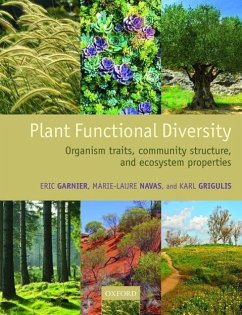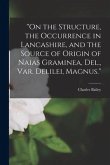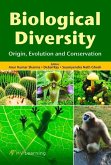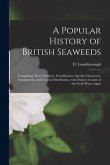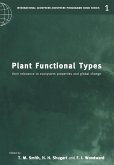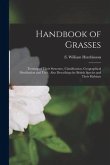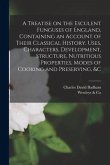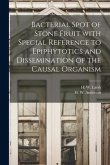Eric Garnier, Marie-Laure Navas, Karl Grigulis
Plant Functional Diversity: Organism Traits, Community Structure, and Ecosystem Properties
Schade – dieser Artikel ist leider ausverkauft. Sobald wir wissen, ob und wann der Artikel wieder verfügbar ist, informieren wir Sie an dieser Stelle.
Eric Garnier, Marie-Laure Navas, Karl Grigulis
Plant Functional Diversity: Organism Traits, Community Structure, and Ecosystem Properties
- Broschiertes Buch
- Merkliste
- Auf die Merkliste
- Bewerten Bewerten
- Teilen
- Produkt teilen
- Produkterinnerung
- Produkterinnerung
This is the first book to present the rationale for a trait-based approach to functional diversity in the context of comparative plant ecology.
Andere Kunden interessierten sich auch für
!["e;On the Structure, the Occurrence in Lancashire, and the Source of Origin of Naias Graminea, Del., Var. Delilei, Magnus."e; "e;On the Structure, the Occurrence in Lancashire, and the Source of Origin of Naias Graminea, Del., Var. Delilei, Magnus."e;]() Charles Bailey"e;On the Structure, the Occurrence in Lancashire, and the Source of Origin of Naias Graminea, Del., Var. Delilei, Magnus."e;15,99 €
Charles Bailey"e;On the Structure, the Occurrence in Lancashire, and the Source of Origin of Naias Graminea, Del., Var. Delilei, Magnus."e;15,99 €![Biological Diversity: Origin, Evolution and Conservation Biological Diversity: Origin, Evolution and Conservation]() Arun Kumar SharmaBiological Diversity: Origin, Evolution and Conservation54,99 €
Arun Kumar SharmaBiological Diversity: Origin, Evolution and Conservation54,99 €![A Popular History of British Seaweeds: Comprising Their Structure, Fructification, Specific Characters, Arrangement, and General Distribution, With No A Popular History of British Seaweeds: Comprising Their Structure, Fructification, Specific Characters, Arrangement, and General Distribution, With No]() A Popular History of British Seaweeds: Comprising Their Structure, Fructification, Specific Characters, Arrangement, and General Distribution, With No29,99 €
A Popular History of British Seaweeds: Comprising Their Structure, Fructification, Specific Characters, Arrangement, and General Distribution, With No29,99 €![Plant Functional Types Plant Functional Types]() T. M. Smith / H. H. Shugart / F. I. Woodward (eds.)Plant Functional Types62,99 €
T. M. Smith / H. H. Shugart / F. I. Woodward (eds.)Plant Functional Types62,99 €![Handbook of Grasses: Treating of Their Structure, Classification, Geographical Distribution and Uses: Also Describing the British Species a Handbook of Grasses: Treating of Their Structure, Classification, Geographical Distribution and Uses: Also Describing the British Species a]() Handbook of Grasses: Treating of Their Structure, Classification, Geographical Distribution and Uses: Also Describing the British Species a19,99 €
Handbook of Grasses: Treating of Their Structure, Classification, Geographical Distribution and Uses: Also Describing the British Species a19,99 €![A Treatise on the Esculent Funguses of England, Containing an Account of Their Classical History, Uses, Characters, Development, Structure, Nutritious A Treatise on the Esculent Funguses of England, Containing an Account of Their Classical History, Uses, Characters, Development, Structure, Nutritious]() Charles David BadhamA Treatise on the Esculent Funguses of England, Containing an Account of Their Classical History, Uses, Characters, Development, Structure, Nutritious22,99 €
Charles David BadhamA Treatise on the Esculent Funguses of England, Containing an Account of Their Classical History, Uses, Characters, Development, Structure, Nutritious22,99 €![Bacterial Spot of Stone Fruit With Special Reference to Epiphytotics and Dissemination of the Causal Organism Bacterial Spot of Stone Fruit With Special Reference to Epiphytotics and Dissemination of the Causal Organism]() Bacterial Spot of Stone Fruit With Special Reference to Epiphytotics and Dissemination of the Causal Organism15,99 €
Bacterial Spot of Stone Fruit With Special Reference to Epiphytotics and Dissemination of the Causal Organism15,99 €-
-
-
This is the first book to present the rationale for a trait-based approach to functional diversity in the context of comparative plant ecology.
Produktdetails
- Produktdetails
- Verlag: Sydney University Press
- Seitenzahl: 256
- Erscheinungstermin: 3. Februar 2016
- Englisch
- Abmessung: 246mm x 187mm x 25mm
- Gewicht: 552g
- ISBN-13: 9780198757375
- ISBN-10: 0198757379
- Artikelnr.: 44365841
- Verlag: Sydney University Press
- Seitenzahl: 256
- Erscheinungstermin: 3. Februar 2016
- Englisch
- Abmessung: 246mm x 187mm x 25mm
- Gewicht: 552g
- ISBN-13: 9780198757375
- ISBN-10: 0198757379
- Artikelnr.: 44365841
Eric Garnier is a researcher in plant functional ecology. His work on plant functional diversity is based on a combination of conceptual, experimental and methodological approaches, and contributes to the broad field of trait-based comparative ecology. He has pioneered some of the developments of conceptual models of relationships between plant functional traits, plant function, and biogeochemistry, and has participated in the development of standardized approaches to the measurement of plant traits towards a worldwide application. More recently, he has contributed to the emergence of ecoinformatics at the French national scale, especially through his work as the Director of CEntre for the Synthesis and Analysis of Biodiversity. Marie-Laure Navas works on the identification of the functional diversity of plant species. More precisely, her work focuses on i) the identification of assembly rules of plant communities due to biotic and abiotic processes; ii) the characterization of changes in functional structure of plant communities along environmental gradients; iii) the identification of traits related to competition and facilitation ability of plants. These questions are addressed with the example of managed grasslands, especially in the French Mediterranean area. Recently, Marie-Laure Navas also developed collaborations with researchers in crop science and weed science, in order to test the relevance of the functional approach for developing new cropping systems based on more ecological-directed regulation of pests. Karl Grigulis works as a research engineer in the Laboratoire d'Ecologie Alpine in Grenoble, France. Initially working as an agronomist in south-east Australia on topics of population ecology using pasture weeds as model systems, more recently in France he participates in projects focussed on functional and community ecology, in particular the field assessment of community functional structure as a determinant of ecosystem services.
* 1: A functional approach to biological diversity
* 2: Trait-based ecology: definitions, methods, and a conceptual
framework
* 3: The functional characterisation of plants
* 4: Gradients, response traits, and ecological strategies
* 5: A functional approach to plant community structure
* 6: Plant traits and ecosystem properties
* 7: Functional diversity and ecosystem services
* 8: Functional diversity in agriculture: the cases of grasslands and
crop weeds
* 9: Managing functional diversity data
* 10: Perspectives for functional diversity research
* 2: Trait-based ecology: definitions, methods, and a conceptual
framework
* 3: The functional characterisation of plants
* 4: Gradients, response traits, and ecological strategies
* 5: A functional approach to plant community structure
* 6: Plant traits and ecosystem properties
* 7: Functional diversity and ecosystem services
* 8: Functional diversity in agriculture: the cases of grasslands and
crop weeds
* 9: Managing functional diversity data
* 10: Perspectives for functional diversity research
* 1: A functional approach to biological diversity
* 2: Trait-based ecology: definitions, methods, and a conceptual
framework
* 3: The functional characterisation of plants
* 4: Gradients, response traits, and ecological strategies
* 5: A functional approach to plant community structure
* 6: Plant traits and ecosystem properties
* 7: Functional diversity and ecosystem services
* 8: Functional diversity in agriculture: the cases of grasslands and
crop weeds
* 9: Managing functional diversity data
* 10: Perspectives for functional diversity research
* 2: Trait-based ecology: definitions, methods, and a conceptual
framework
* 3: The functional characterisation of plants
* 4: Gradients, response traits, and ecological strategies
* 5: A functional approach to plant community structure
* 6: Plant traits and ecosystem properties
* 7: Functional diversity and ecosystem services
* 8: Functional diversity in agriculture: the cases of grasslands and
crop weeds
* 9: Managing functional diversity data
* 10: Perspectives for functional diversity research
